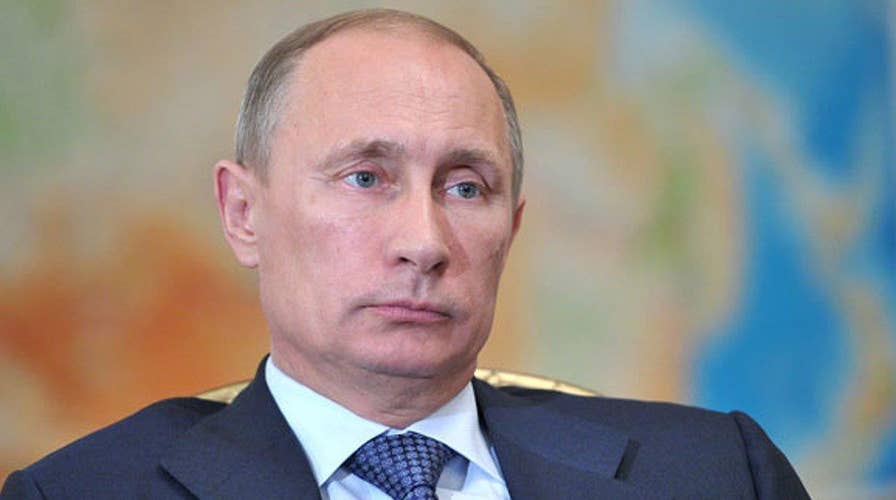Russia urged to leave Aleppo's corridors to the UN
The United Nations are concerned that the Russians, Assad regime are using the operation for military purposes; Kevin Corke explains on 'Special Report'
BEIRUT – Syrian rebels launched an offensive aimed at breaking the government's siege of eastern Aleppo on Sunday, where the U.N. estimates some 300,000 people are trapped with dwindling food and medical supplies.
As the powerful, ultraconservative Ahrar al-Sham faction announced the rebels' campaign, residents in the northern city's besieged opposition quarters burned tires to reduce visibility for fighter jets flying overhead, according to local activist Wissam Zarqa.
The Britain-based Syrian Observatory for Human Rights, which gathers information from a network of local informants, said rebels and pro-government forces were clashing along several fronts on the outskirts of the divided city. Aleppo was Syria's largest city and its commercial capital before the war.
Presumed Russian or government jets bombed neighborhoods in the eastern side, the Observatory reported. Earlier in the day, helicopters dropped unguided barrel bombs on the opposition-controlled neighborhood of Bustan al-Basha, it said.
Government forces closed off the last route to the opposition holdout in early July, replicating siege tactics that it has employed with mixed results throughout the war. Opposition neighborhoods in Homs, the country's third largest city, surrendered to government control in 2014 after a two-year siege left residents at the brink of starvation. Other sieges have lasted until today, with devastating humanitarian consequences.
The U.N.'s special envoy to Syria, Staffan de Mistura warned Friday that basic supplies in eastern Aleppo could run out in three weeks.
The Syrian and Russian militaries announced safe corridors for residents who wanted to leave the besieged area Thursday, but according to the Russian government, only 169 civilians had left by Saturday. Several rights groups have warned that it is illegal to deprive civilians of basic necessities, and that residents should not have to choose between leaving their homes or starving.
In southern Syria, an airstrike on a hospital in an opposition-controlled town put the facility out of service Sunday.
The hospital in Jasem was targeted in one of several airstrikes to hit the town in Deraa province, located some 35 miles (57 kilometers) south of Damascus, according to the Local Coordination Committees activist network. The group said six people were killed in the strikes, blaming them on the government.
The Syrian Observatory for Human Rights monitoring group said the hospital strike killed a pharmacist and put the facility out of service.
In a statement later Sunday, the president of the International Rescue Committee, David Miliband, said the group was "dismayed" and "angry" at the attack on the hospital, which it was supporting. It said six people had been killed in the strike, and many more wounded. It said that across Syria "aid workers and civilians are being targeted in a merciless way on a daily basis," and called for all those involved to be held to account.
Hospitals are regularly targeted in Syria's war, drawing condemnation from the U.N. and the international community. The New York-based Physicians for Human Rights says over 90 percent of attacks on medical facilities in Syria have been carried out by pro-government forces.
In the capital, Damascus, Ramzy Ramzy, the U.N.'s deputy special envoy for Syria, reiterated the United Nations' intent to resume talks between the government and the opposition in late August, saying he discussed a political transition process with Foreign Minister Walid Moallem. The opposition has demanded that President Bashar Assad step down, after the harsh government crackdown on protests in 2011 sparked a catastrophic civil war.
Whether the opposition and the international community will agree to have Assad rule during a transition period or beyond is a key sticking point in negotiations.
"The minister confirmed the intention of the Syrian government to participate in these talks once they are held," said Ramzy.
De Mistura was simultaneously meeting with the Iranian deputy foreign minister in Tehran, a close ally to the Damascus government.
In Syria's north, a U.S.-backed, Kurdish-led fighting force managed to secure control of 40 percent of the Islamic State-held town of Manbij, a vital satellite to the extremist group's de facto capital in Raqqa, according to the Observatory.
The latest advance by the Syrian Democratic Forces opened the way for some 2,300 additional civilians to evacuate the town, the Observatory said. A spokesman for the SDF, Sherfan Darwish, said between 40,000 and 50,000 civilians have been released from IS control over the course of the campaign for the town, now entering its third month. He said the SDF controlled nearly three-quarters of Manbij.
Over a quarter million people have been killed in Syria's war. The U.N. estimates that half of the country's population has been displaced.









































